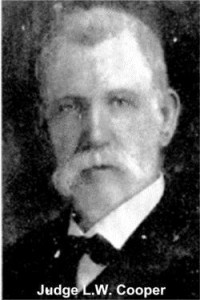
Judge Leroy Washington Cooper, whose support of the creation of Delta County was repaid by the naming of the county seat Cooper.
Delta County has a unique landscape and history. Surrounded on two sides by the North Sulphur River and the Middle Sulphur River, the county was not created until 1870, much later than adjacent counties. It was carved out of land previously located in Lamar and Hopkins counties with slivers from Hunt and Fannin Counties to the west. The reason was very logical. The North and Middle Sulphur Rivers as well as the South Sulphur flowing below Commerce were notorious for inundating the countryside during rainy weather. Travel to Paris or Sulphur Springs from the area for court related business was often impossible.
After the Civil War, residents of the area petitioned the state for a new county. When approved, the Texas legislature chose the name Delta for the new county. Delta is a Greek word for triangle, very appropriate for the shape of the county. In keeping with the 19th century tradition of locating towns on higher elevations, the county seat sits on a hill that slopes down to both rivers.
It was the citizens who chose the name of the new county seat. The chairman of the House Committee on Counties and Boundaries actively supported the bill to create Delta County. His name was Leroy Washington Cooper (1822-1900). The grateful citizens chose the name Cooper in honor of his support.
Leroy Cooper was the representative from the 9th District that included Houston, Cherokee, Anderson, Henderson and Smith Counties. His term of office was short, to say the least. By late 1870 Governor E. J. Davis appointed Cooper judge of the Third District Court.
Leroy W. Cooper had an unusual career in Texas politics. Born in Georgia, he brought his family to Crockett in Houston County in 1856. There he opened a law practice, became a small planter and school examiner, and held from ten to twelve slaves until emancipation in 1865. He rapidly rose to the upper ten percent of wealth in Houston County. Yet, he was a member of the Whig Party who strongly supported the Union and the Constitution. Many other Texans faced the same issues.
Were they to support their state and accept the Confederacy or did they stay true to the Union? If they followed the latter choice, did they flee Texas and join the Union Army or stay and face angry neighbors and perhaps death? Judge Cooper left no written record to provide an insight into his feelings, but he did join the 11th Brigade of Texas State Troops from Houston County. He was elected Colonel of the Brigade but later resigned to become a representative in the Confederate Texas Legislature. By late 1864 he was back in Crockett practicing law.
As soon as A. J. Hamilton was appointed governor of the state, he in turn appointed Leroy W. Cooper judge of the 9th District Court. It was then that Cooper joined the Republican Party, having never supported the Southern Democrats. After the Radical Republicans removed him from the court in 1866 he served a term in the state legislature, again was appointed judge of the 3rd District until 1878. At that time he returned to private practice.
Cameron Sinclair, a doctoral candidate in history at University of North Texas provided this information in his article “From Slave Owner to Scalawag: The Life of Leroy W. Cooper.” It appeared in the Spring 2014 East Texas Historical Journal.
